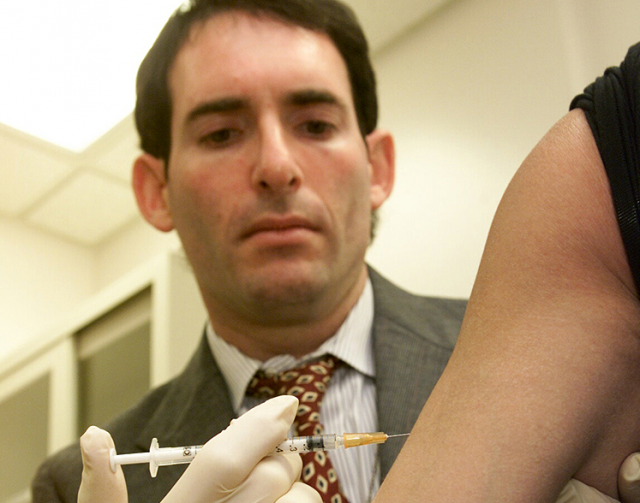
Many well-established vaccines are needlessly controversial, but a recently developed vaccine that targets the human papilloma virus (HPV) has some properties that caused unusual amounts of public discomfort. The vaccine itself doesn't actually prevent disease symptoms, since HPV infection goes largely unnoticed. Instead, it helps prevent a long-term outcome of infection: cervical cancer.
As the cancer's location might suggest, HPV is primarily spread through sexual contact, which is where the controversy comes in. For it to have the highest effectiveness, the vaccine must be administered before girls become sexually active, and thus at risk for HPV infection. To ensure this happens, public health authorities have recommended that girls receive the vaccine when they are 10-11 years old, an age that raises awkward questions about impending sexual activity with many parents. Meanwhile, boys are a common vector for the virus, but most recommendations have not suggested that they also be vaccinated.
Despite the public backlash (the vaccine actually became an issue in this year's Republican presidential campaign), many young women have been vaccinated, and a new study suggests that a form of herd immunity is already developing, in which the use of the vaccine is protecting women who haven't received it.
The study screened for the presence of HPV in two populations of sexually active teens and young women at two points: before the introduction of the vaccine in 2006, and four years after its introduction (in 2010). The populations were small (only about 400 at each time point), but still large enough to produce statistically significant results. A bigger problem was that the demographics of the two populations were quite different in terms of several factors associated with risk for HPV infection. The authors used an adjustment factor to control for this, but also provided the raw, unadjusted data.
Given that several clinical trials had shown that the vaccine is effective, it's no real surprise that the rate of infection with the four strains targeted by the vaccine (the ones most commonly associated with cervical cancer) went down significantly, dropping by about a third. (Many of the residual infections may result from not taking a complete course of the vaccine or having started it after the onset of sexual activity.) The big surprise is that the rate also dropped in those who hadn't been vaccinated, going from over 30 percent to under 20 percent. Adjusting for risk factors made the drop even more significant.
The authors suggest that this may be an indication of a very quick onset of a phenomenon called herd immunity. When there are fewer people around that carry an infectious agent, the chances of picking it up drop, so that even those who are not immune benefit from vaccination campaigns.
The vaccine itself only targets four strains of HPV, the ones most commonly associated with cancer. However, the researchers found that rates of infection with other strains had increased, going from roughly sixty percent to over 75 percent. The authors suggest this may be evidence that a concern voiced by some researchers may be playing out: the different strains of HPV compete with each other to some extent and, with the vaccine eliminating some of them, the remainder are spreading more efficiently. Fortunately, these other strains are less prone to causing cancer.
The population is small, and these results should be considered preliminary. But the possible indication of herd immunity is very promising news, even if the increased infection with other strains bears further monitoring. In the meantime, the authors reiterate that the numbers could be even better if more girls received a full vaccination before the age of 13. On the plus side, it's now recommended that boys be vaccinated as well, which should only enhance the herd immunity effect.
Three of the study's seven authors received funding for separate clinical trials from Merck, which developed the vaccine.
Pediatrics, 2012. DOI: 10.1542/peds.2011-3587 (About DOIs).
reader comments
124